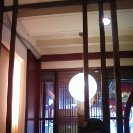Chinese Holidays and the Culture of China
Traditional Chinese Holidays
In today's Chinese society the traditional Chinese holidays still play an important
role. Many of these holidays follow the lunar calendar.
Below only the traditional holidays incorporated in today's calendar are mentioned.
|
China started using the western (solar) calendar after the end
of the Qing dynasty, about one hundred years ago. However, although
China, Taiwan and Hong Kong have embraced the western or solar calendar,
the traditional Chinese Calendar which is based on the moon phases, is
still used in parallel. |
In fact, even many other special occasions in the social life of people,
like weddings or the date of funerals, and many others are selected
according to the Lunar Calendar and set to a day considered auspicious
for that specific occasion.
The following are the most important Chinese holidays, mostly based on
the lunar calendar. These holidays are observed by most Chinese in
China, Hong Kong and Taiwan; other holidays may be more regional.
Many Chinese holidays differ each year when seen with the solar calendar.
The links below (Peasant Calendar website) provides excellent information. See:
Chinese Calendar - for current month
Lunar holidays - for public holiday details
New Year's Eve:
This is the first holiday of the Chinese New Year.
New Year's Day:
(in 2016) February 8th = day 1 of 1st moon of the Lunar Calendar (* see note)
The Chinese New Year or Spring Festival has a very special position
among these holidays. Traditionally, in Chinese society it is the most important
festival of the whole year. The Chinese or Lunar New Year usually falls
either on the end of January or February.
Actually, the holidays start with New Year's Eve, which is a traditional
get-together for dinner for the whole family, wherever they may live.
Public holidays last until the 5th day of the first moon, at least. But
the traditional New Year's end is the night of the 15th day of the first
moon.
Lantern Festival:
22th day of 1st moon.
On the day - or rather night - of the first full moon, the Chinese New Year (or Spring Festival) traditionally ends with a bang, the Lantern Festival.
Qing Ming:
Among Chinese this important holiday is known as "Grave or Tomb Sweeping Day".
The people traditionally clean their ancestor's graves at or around this day.
April 5th. Tomb Sweeping Day is considered one of the three most
important holidays by many Chinese. The other two are New Year and the
Mid-Autumn Festival.
See Qing Ming.
Duan Wu:
Dragon boat festival
5th day of 5th moon.
June 10th (2016)
Qixi:
Chinese lover's day, or rather night.
Qixi (Japanese: Tanabata) is according to romantic folklore the night when the Weaver (girl) and Cowherd (both are star constellations) meet, once a year. This occurs on the 7th day of the 7th moon.
Ghost month (mainly Daoist):
The 7th month or moon of the lunar calendar is traditionally considered
as bad for many occasions, and business may be sluggish during this
month.
Many people will put off important decisions, weddings, etc.
If they want to move to a new home, or even only are looking for a new
home, many will delay this until the 7th month is over.
This is the so-called Ghost Month during which according to tradition
the gates to the other world open and the ghosts of the departed return
temporarily to this world. As the gates close again at the end of the
7th month normal activities resume.
Spirit Festival:
Middle of the ghost month, when offering to ancestors are made.
(Daoist, Buddhist)
7th day of 7th moon
Mid-autumn Festival:
Moon festival
15th of 8th moon. In Chinese culture this is an important holiday for family reunion.
* Notes:
In Chinese the months do not have any name. In the Chinese language the
months are associated with numbers. For example, January would be called
"1st moon", etc.
In above presentation, if only "moon" is mentioned, instead of month, the meaning is usually the lunar month.)
Chinese Calendar and Year Notation
Chinese Zodiac
Return from Chinese Holidays to Home Page


